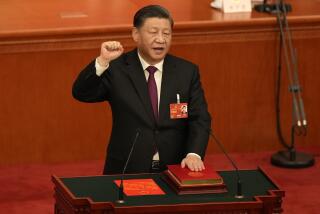China officially elevates Xi Jinping to level of Mao
Reporting from Beijing — China’s Communist Party on Tuesday affirmed President Xi Jinping’s status as the most powerful ruler since Mao Tse-tung, handing the authoritarian leader even greater control to enact his nationalist vision of a resurgent China.
Officials agreed to embed Xi’s name and political ideology into the party constitution at the close of a twice-a-decade party congress, China’s most important political event. All 2,300-some delegates voted to enshrine the wordy proclamation, “Xi Jinping Thought on Socialism with Chinese Characteristics for a New Era.”
Only Mao received an eponymous reference in the constitution while he still held power. Deng Xiaoping, who succeeded Mao and opened the economy to the world, was honored with “Deng Xiaoping Theory” after his death. The designation comes just five years into Xi’s term, earlier than with his predecessors. It will form the basis of university papers; elementary students will study its meaning; leaders will include it in speeches.
Xi’s elevated role not only makes it easier to achieve his aims, but it also makes challenging him on them much tougher.
“This confirms Xi’s status as Mao Tse-tung of the 21st century,” said Willy Lam, an expert on elite politics at the Chinese University of Hong Kong.
Xi used the congress to convey his vision of a flourishing, influential country with the party entrenched at its core. He sees an aggressive foreign policy, stronger national security and ideological cohesion as key elements in the development of a “great modern socialist country.”
“We must keep on striving with endless energy toward the great goal of national rejuvenation,” Xi told delegates after the vote in the Great Hall of the People, with the party’s gold star centered on the ceiling above.
The move is a striking break from the consensus leadership that Deng encouraged as he sought to rebuild a country ravaged by Mao’s single-handed and vicious Cultural Revolution. That model has guided party politics for decades. Tuesday’s announcement lifts Xi above predecessors Jiang Zemin and Hu Jintao, who embodied a “first among equals” rationale.
Xi has upended that course. Although others have pushed party reforms, he’s taken them to a new level.
“Xi’s era has come,” said Zhang Lifan, a Beijing historian and political commentator.
It started with Xi’s three-and-a-half-hour speech Wednesday that opened the congress. The marathon keynote received ingratiating praise from ambassadors and delegates. State media covered little other news. Slick propaganda videos throughout the week showed aspirational children and foreign entrepreneurs living out Xi’s “Chinese Dream.”
Delegates also amended the constitution to reflect the party’s absolute rule over the military — which Xi controls — and support for the Belt and Road initiative, a global infrastructure plan Xi spearheaded that links China to Europe.
A dramatic unveiling of the top leadership on Wednesday is expected to further showcase Xi’s influence, hinting at a reign past his decade tenure.
Rumors have circulated for weeks, but few know what will actually happen until the new Politburo Standing Committee members walk onto a red-carpeted stage about noon and present themselves to the world.
No younger men — and it will almost certainly be men — may indicate Xi doesn’t intend to groom a successor, as his predecessors did. That will feed speculation that he’s plotting to stay in control. Xi is limited to two terms as president, but faces no such requirements as head of the Communist Party or chairman of the Central Military Commission.
He may also choose to buck tradition and simply anoint an heir later in his term.
“Xi has just decided he will put himself front and center, and this allows a broader canvas,” said Jude Blanchette, a researcher at the Conference Board in Beijing. “If you are talking about national rejuvenation and national greatness, what can’t you do?”
Some analysts predicted Xi, 64, would bend retirement norms to keep on 69-year-old Wang Qishan, his close ally and head of the powerful anti-corruption agency. That would have set a new precedent and smoothed the way for Xi’s own extension. But Wang’s name was not on a list of the new Central Committee, the broader group that votes in the Politburo, a sign he will step down.
Chinese flags waved over Tiananmen Square on Tuesday, a rare moment devoid of tourists. Throngs of security guards parted as delegates boarded buses outside the Great Hall and prepared to leave.
When Xi came to power, “the story was nothing changes, collective leadership persists and people, in general, thought Xi would be a continuation of his predecessor Hu,” said Trey McArver, co-founder of Trivium China, a Beijing research firm.
“It’s pretty striking how wrong everybody was.”
Meyers is a special correspondent.
Twitter: @jessicameyers
Nicole Liu and Gaochao Zhang in the Times’ Beijing bureau contributed to this report.
UPDATES:
6:35 a.m.: This story was updated throughout with staff reporting.
This story was originally published at 10:40 p.m. Oct. 23.
More to Read
Sign up for Essential California
The most important California stories and recommendations in your inbox every morning.
You may occasionally receive promotional content from the Los Angeles Times.










